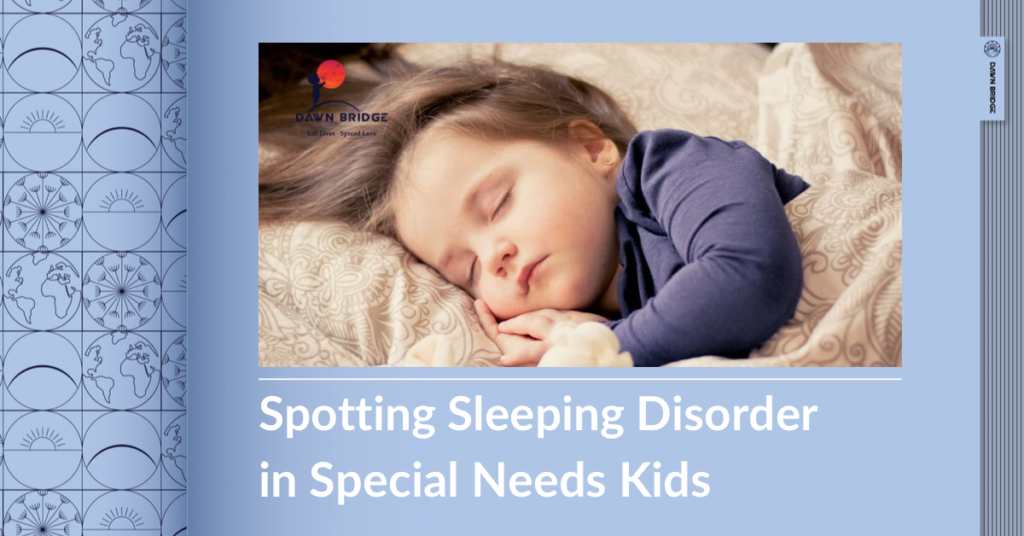Sleeping disorders in special needs kids are prevalent and impair academic function and daytime behaviour due to their underlying medical problems, nutritional deficiency and psychological stressors. It is a multifactorial disorder, and it affects their daily lives heavily, not only affecting their scholastic performance, mental status and even worsening, it will exacerbate their existing medical problems.
Therefore, when approaching them, professionals will have to assess their sleep history in detail, including the difficulties initiating or maintaining sleep, snoring, abnormal movements or behaviour during sleep and accompanying symptoms( irritability, restlessness, aggressiveness etc.).
The following are the possible causes, symptoms, and signs that special needs children usually have:
| Possible factors contribute to sleeping disorders | Symptoms and Signs | |
| Autism Spectrum Disorder (ASD) | – Sleep-wake mechanisms and problems – Brain areas and hormones involving sleep (e.g., GABA and melatonin) – Wake maintenance (e.g., serotonin, acetylcholine and glutamate | – Bedtime resistance – Sleep anxiety – Sleep-onset disturbances – Frequent waking, restlessness or abnormal sleep architecture |
| Attention-deficit/hyperactivity disorder (ADHD) | – Dopaminergic abnormalities in the nigrostriatal brain region – Decreases in the volume of the pineal gland and/or clock gene BMAL1 and PER2 exceptions and the external environment – Endogenous melatonin increase delay – Dysregulation of dopamine and noradrenaline Iron deficiency | – Sleep-disordered breathing (SDB) – Restless leg syndrome (RLS) – Circadian rhythm sleep disorders (CRDs) – InsomniaNarcolepsy |
| Cerebral Palsy(CP) | – The presence of active epilepsy – Epileptic drug consumption – Low vision – Hypoventilation due to the central nervous system or muscle weakness – GI discomfort – Chronic pain | – Dysfunctional circadian rhythms – Obstructive sleep apnea |
| Dyslexia | – Deficiency of iron, vitamin B12 and vitamin D – Genetic predisposition – Underlying medical or psychiatric conditions – Caffeine intake – Poor sleep habits – High parental expectations | – Initiating and maintaining sleep – Sleep breathing disorders – Disorders of arousal |
| Tourette syndrome | – Involvement of basal ganglia system and dopaminergic system | – Insomnia – Excessive daytime sleepiness – Disorders of arousal – The persistence of tics during sleep – Presence of periodic limb movements during sleep (PLMS) |
Tips May Help With Sleeping Disorders in Special Needs
Genetics, hormones, dietary nutrition, drugs, and the muscle and nervous system significantly impact sleep wellness. Sufficient and healthy sleep has proven essential for developing children and adolescents, and healthy sleep wellness helps establish and maintain their cognition function and memory. Here are some tips that are scientifically proven for handling sleeping disorders in special needs:
1. Create an environment suitable for sleep
Minimise light and noise and manage the temperature.
2. Eat a well-balanced diet and supplements
Avoid heavy meals at night. Melatonin and GABA supplements may help one fall asleep.
3. Practice good sleep hygiene
Get up from bed simultaneously each day, which will help one maintain their sleep quality and length.
4. Exercise
Being physically active in the morning will help one fall asleep at night.
Conclusion
Estimations of the prevalence of sleep disorders in school children from the general population vary widely from 10% to more than 40% in different epidemiological studies. This highlight the need to integrate sleep assessment into routine paediatric health care practice for more accurate data. So, scientists can develop a promising and integrated therapy in the future through the analyses of sleeping disorders in special needs children.
References:
- Hulst RY, Gorter JW, Voorman JM, Kolk E, Van Der Vossen S, Visser-Meily JMA, Ketelaar M, Pillen S, Verschuren O. Sleep problems in children with cerebral palsy and their parents. Dev Med Child Neurol. 2021 Nov;63(11):1344-1350. doi: 10.1111/dmcn.14920. Epub 2021 May 15. PMID: 33990937; PMCID: PMC8597175.
- van der Heijden KB, Stoffelsen RJ, Popma A, Swaab H. Sleep, chronotype, and sleep hygiene in children with attention-deficit/hyperactivity disorder, autism spectrum disorder, and controls. Eur Child Adolesc Psychiatry. 2018 Jan;27(1):99-111. doi: 10.1007/s00787-017-1025-8. Epub 2017 Jul 8. PMID: 28689312; PMCID: PMC5799342.
- Smith FR, Henderson LM. Sleep problems in children with dyslexia: understanding the role of sleep in neurocognitive development through the lens of developmental disorders. Acta Paediatr. 2016 Sep;105(9):999-1000. doi: 10.1111/apa.13506. PMID: 27514003.
- Mercier L, Pivik RT, Busby K. Sleep patterns in reading disabled children. Sleep. 1993 Apr;16(3):207-15. doi: 10.1093/sleep/16.3.207. PMID: 8506452.
- Jiménez-Jiménez FJ, Alonso-Navarro H, García-Martín E, Agúndez JAG. Sleep disorders in tourette syndrome. Sleep Med Rev. 2020 Oct;53:101335. doi: 10.1016/j.smrv.2020.101335. Epub 2020 May 20. PMID: 32554211.

